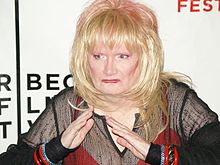Jayne County | |
|---|---|
 County at the première of Squeezebox! at the 2008 Tribeca Film Festival | |
| Background information | |
| Born | July 13, 1947 Dallas, Georgia, U.S. |
| Genres | |
| Occupations |
|
| Instruments |
|
| Labels | |
| Website | www |
Jayne County (born Wayne Rogers, July 13, 1947) is an American singer, songwriter, actress and record producer whose career has spanned six decades. Under the name Wayne County (inspired by Wayne County, Michigan), she was the vocalist of influential proto-punk band Wayne County & the Electric Chairs who became known for their campy and foul-mouthed ballads, glam punk inspired songs, and image which was heavily influenced by Jackie Curtis[2] and the Theatre of the Ridiculous.[3] County in particular was known for her outrageous and unpredictable stage antics as well as possessing a distinctive singing voice. She went on to become rock's first openly transgender singer, and adopted the stage name Jayne County.
County's music has encompassed a number of styles over the course of her career, including glam punk, punk rock, blues rock, and boogie-woogie.[1] County did not think her birth name Wayne Vernoy Rogers "sounded very glamorous" and decided to adopt the name of the county in which Detroit was located because she admired bands from that city "like Iggy [Pop] and all those people."[4] Though she has never been a commercial success, she has been an influence on a number of musicians including David Bowie, the Ramones, Patti Smith, Pete Burns and Lou Reed,[5] and many of County's songs have become well-known, including "Man Enough to Be a Woman", "Fuck Off", "Stuck on You," and "Night Time". Pianist Jools Holland's first studio outing was with County on her single "Fuck Off". She also appeared as an actress at Andy Warhol's Factory and had a brief association with David Bowie during the 1970s. County played Lounge Lizard in the second punk rock film, Derek Jarman's Jubilee, and the band performed "Paranoia Paradise",[6] which also appeared on the Jubilee Soundtrack album, released by Polydor UK in 1978. Wayne County and the Electric Chairs were supported by The Police during their 1977 tour of Holland,[7] later recruiting Police guitarist Henry Padovani on rhythm guitar.[8]
- ^ a b "Wayne County – Singles". Punk77.co.uk. Retrieved September 17, 2012.
- ^ "WHY WAS TRANSGENDER PUNK ICON JAYNE COUNTY BANNED FROM FACEBOOK?". Dangerous Minds. April 23, 2014. Retrieved March 23, 2021.
- ^ Little, Michael H (March 4, 2021). "Graded on a Curve: Jayne/Wayne County and the Electric Chairs, The Best of Jayne/Wayne County and the Electric Chairs". the Vinyl District. Archived from the original on March 4, 2021. Retrieved March 23, 2021.
- ^ Steve Zehentner. Jayne County, The Lower East Side Biography Project, excerpt from 28 minute biography. Vimeo. Event occurs at 00:15.
- ^ Philip Auslander (2006). Performing Glam Rock: Gender and Theatricality in Popular Music. University of Michigan Press. ISBN 0472068687. Retrieved September 16, 2015.
- ^ Paul Marko (January 16, 2001). "JJ Johnson: Drummer Electric Chairs". Punk77.co.uk. Retrieved August 1, 2010.
- ^ Sutcliffe, Phil & Fielder, Hugh (1981). L'Historia Bandido. London and New York: Proteus Books. ISBN 0-906071-66-6. Pages 42 and 54.
- ^ Padovani, Henry (2009). Secret Police Man. Pen Press. pp. 90–97. ISBN 978-1-907172-83-0.